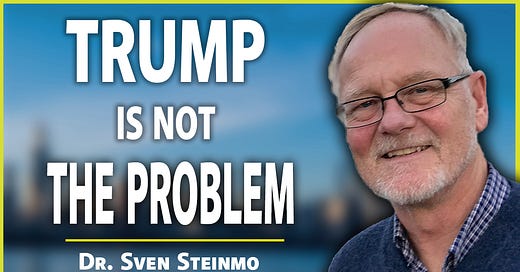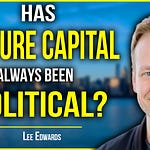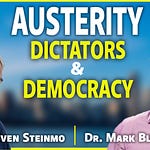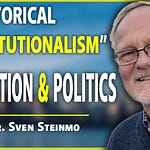The piece can be read below. Attached is my conversation with Sven Steinmo on his stance detailed in this piece. Feel free to play the audio or watch the YouTube video with this link.
Written by Sven Steinmo
There is a lot of hand-wringing today about Donald Trump's potential to get elected as the next president of the United States (again). It's not only that people dislike his grandiose and narcissistic personality. Nor is it even that they fear that he will be on the ballot in November. The real fear these days is that he will undermine our hallowed Constitution. After all this narrative holds, the Constitution has made our country great, and we have the most democratic constitution in the world.
Ironically, the MAGA supporters of Donald Trump have a remarkably similar argument. But in their case, they think that our Constitution has already been undermined by the elites that run our political system. They believe the US Constitution was a profoundly democratic institution hampered by the “political elite.”
They are both wrong. The US Constitution was never a particularly democratic document. In fact, the US Constitution was constructed precisely because the elite in America in the latter part of the 18th century were terrified of democracy. The much beloved “checks and balances” were established precisely because America's elite believed that the democratic impulses unleashed by the Revolutionary War had gotten out of hand. Ask yourself, what is being checked in a system? Why is power divided power so profoundly in the American political system? The answer was, as Madison claimed, the “passions and the interests” of the uneducated masses needed to be checked.
“The essential truth," Richard Henry Lee observed, was that the Constitution was "a transfer of power from the many to the few."[i] Or as historian Gordon Wood put it: “All of what the Federalists wanted out of the new central government seemed in the final analysis dependent upon the pre-requisite maintenance of aristocratic politics.”[ii]
In a very real sense, the Declaration of Independence motivated many average Americans to participate in the Revolutionary War. It should not be surprising that after the war, they thought that “all men are created equal” and that there should be no taxation without representation. They were most certainly not fighting for an elite-based political system that would leave out the vast majority of small property holders (not to speak of those without property).
And so, a small group of wealthy men (the majority of which were slaveholders, by the way) Designed a political system that would “pit faction against faction.” This was not a political system designed to make it easy to pass laws unless the elite had already agreed to them. It was instead a set of political institutions specifically and explicitly designed to ensure it would not be responsive to the majority's will.
James Otis, a prominent lawyer and Revolutionary leader, was blunt:. "When the pot boils, the scum will rise to the top." Gouverneur Morris, who was called the "Penman of the Constitution" and wrote its' preamble, was equally skeptical of the common man. Considering the Shays Rebellion, he complained, "[t]he mob begin to think and reason. Poor reptiles!... they bask in the sun, and ere noon they will bite, depend upon it. The gentry begin to fear this."[iii]
The system checked power over domestic affairs, but America needed strong authority in foreign affairs. Which at that time meant conquering a rich and profoundly fertile continent. So, our political system gave power to the President over foreign policy... (but let’s not forget that the President was not then, and is still not today, elected by average citizens.)
And in many ways, it worked. What became the United States of America, with its small population of only 3 million whites, came to dominate and control the richest piece of real estate on the planet. Literally, millions of Native Americans were killed, starved, and relocated so that the European settlers who flocked to this nation could take advantage of this bounty. After all, what did you need a government for other than ethnically cleansing the lands so that the Europeans could take advantage of them.?
As we entered the 20th century, however, people started to demand more of their government than simply clearing the lands. At first, that meant funding railroads, etcetera, so more people could get out West. But soon, cities became more complex, dirty, and even dangerous. And as factories started to develop in America, average citizens demanded that their government do something to protect them from America's capitalist elite and their policies.
The Progressive Era was the first move in this direction. But here, the fragmentation of American institutions, which allows small and powerful interests to fund elections, was used to the advantage of that very elite. The regulations passed in the Progressive Era of very became hostage to the very interest they were supposed to regulate.
As we all know, that didn't work very well. Then came the Great Depression.
With the election of Franklin Delano Roosevelt, Americans demanded that the government act in their common interest and not just the interest of the rich and powerful. It's hard to overstate his popularity and the New Deal agenda. Roosevelt was elected four times with massive majorities. In many ways, America was on its way to developing something like a majoritarian democracy despite the institutional checks on the will of the people.
It did not last all that long. At first, the Dow family, the Henry Luce family, the Hearsts, etcetera, etcetera were pushed back on their heels. And, of course, World War 2 intervened. The war was another period of a sense of common interest and common purpose. In the process, Americans united around an identity they thought would be democratic and more egalitarian. But by the end of World War 2 and with the death of FDR, the campaign against American democracy came into force.
The sophisticated use of propaganda campaigns, both on television, which was now in almost everyone's home by the mid-50s, and the manipulation of religious leaders - especially in the South - began to undermine people's faith in their government. Equally importantly, government authority was increasingly used to benefit particular groups and interests over others. President Truman tried to build on FDR's legacy by bringing in a National Health insurance plan, but it was systematically undermined even though over 60% of Americans wished for such a plan at the time. (Note that over 60% of Americans have consistently believed that no one should go without health care because they can't afford it or that people should be driven into poverty because their child gets sick.) But that is just one example. There are dozens of others, from gun rights to agricultural price supports to building modern infrastructure.
I will not detail here what would be a very long list of failures of American politics and public policy. It doesn't matter whether you're on the left or the right; I’m sure you have your own list of how our politicians have failed us. But the problem is not “our politicians.” The problem is the constitutional checks on the publics’ will.
And so now we have Donald Trump. What is his basic claim? It is that our political system is run by an elite who doesn't trust average Americans. Bizarrely, though, when they storm the capital to try and bring down the political system, they claim to be defending the Constitution. They would be quite surprised (and no doubt very angry) to learn that this elitism was fundamental to the basic design of our system.
Donald Trump has recently inferred that he would undermine the Constitution and become a dictator on day one. That is very unlikely, given how ensconced the checks and balances are. I don't mean to suggest that he won’t damage American politics or society. I'm certain he will.
My point is more basic: Donald Trump is so popular today because he has something right. Our political system is both anti-democratic and doesn't work very well.
No wonder so many Americans don’t trust our government.
[i] Cited in Countryman, 1987:559. Countryman 1985
[ii] Wood 1969p. 492.
[iii] Cited in Hofstadter 1973p. 7.














Share this post